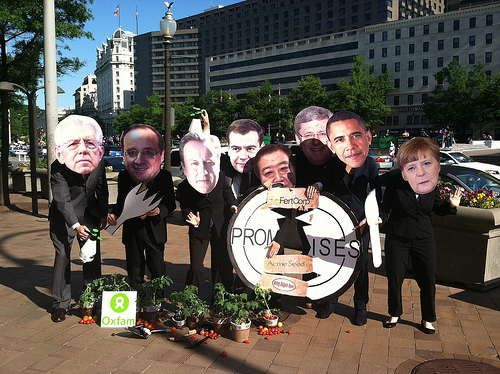G8 Leaders set a bold goal, with a questionable plan to achieve it
At the G8 Summit last weekend, President Obama announced the goal of helping 50 million people lift themselves out of poverty, but G8 plans do not match the plans of developing countries and the needs of their small-scale farmers.
Victoria Marzilli is Oxfam America’s new media specialist.
As the G8 Summit came to a close, we had a bit of a surprise twist in the outcome. There was more movement on food security than we expected and day one of the summit was focused almost solely on that issue, a rarity in recent G8 history. The increased attention was due in part to the stirring outcry from anti-hunger and poverty activists all over the world.
In the weeks before the Summit, Oxfam supporters contributed to the nearly three thousand #DearG8 tweets, keeping the pressure on G8 leaders to help 50 million people lift themselves out of poverty. Our supporters sent thousands of letters to President Obama, to reiterate that message. We also held two media “stunts” during the week of the summit, bringing activists dressed as the G8 leaders to the White House, and then outside the Reagan Building where President Obama unveiled his “New Alliance for Food Security and Nutrition”.
In his pre-G8 speech at the Chicago Council Symposium, and again in his closing remarks, he mentioned the G8 will set a new goal of helping 50 million men, women, and children lift themselves out of poverty through country-led agriculture plans. Since 500 million small farms in developing countries support nearly 2 billion people, supporting those farmers means that their families can earn an income, get an education, and thrive. The goal is spot-on, but the way to achieve that goal doesn’t add up. Though fulfilling their L’Aquila pledges (which were $7.3 billion per year through 2012), the G8 failed to renew their commitments. Instead, they’ve invited the private sector to pledge $3 billion over 10 years in a New Alliance for Food Security and Nutrition. This is a shrinking response to a growing problem and, even if companies deliver, it still represents 96% decrease in investment from previous public funding levels. At a time when more than 18 million people across West Africa are facing a massive food crisis, we need to recognize that the scale of the problem requires a serious investment that matches the plans from people on the ground. After all, aren’t the world’s small-scale farmers who sell their goods in local markets part of the private sector, too?
On the bright side, G8 countries have made additional pledges of $1.2 billion to the Global Agriculture and Food Security Program (GAFSP). Read more about GAFSP here: http://www.gafspfund.org/gafsp. We’re happy to see this important mechanism for country ownership get the funding it deserves.
While it’s reassuring that our leaders are making food security a global priority, we must make sure that we hold them accountable to match the scale of the need and listen to what people in developing countries really need.
